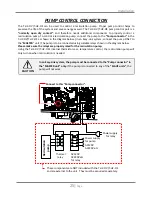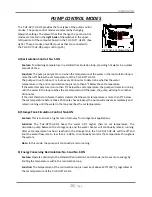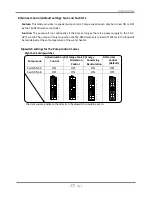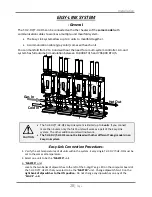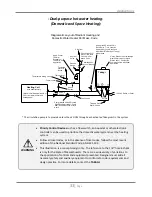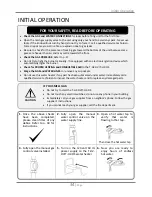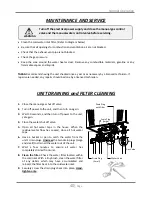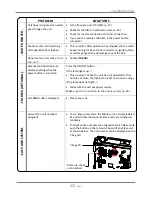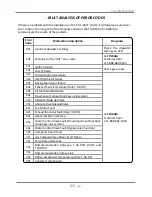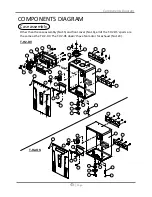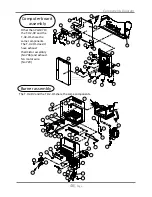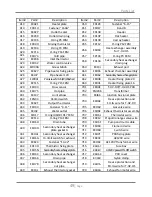
Normal
Operation
39
│
Page
Only
pipes
within
the
water
heater
are
protected
by
the
freeze
protection
system.
Any
water
pipes
(hot
or
cold)
located
outside
the
unit
will
not
be
protected.
Properly
protect
and
insulate
these
pipes
from
freezing.
Household
Flow
Rates
Taken
from
UPC
2006
FLOW
•
The
flow
rate
through
the
T
‐
H2
‐
DV/T
‐
H2
‐
OS
is
limited
to
a
maximum
of
9.0
GPM.
•
The
temperature
setting,
along
with
the
supply
temperature
of
the
water
will
determine
the
flow
rate
output
of
the
unit.
•
Please
refer
to
the
temperature
vs.
gallons
per
minute
chart
on
p.
50
to
determine
the
likely
flow
rates
based
on
your
local
ground
water
temperature
and
your
desired
outlet
water
temperature
combination.
•
Based
on
the
United
States
Department
of
Energy
method
of
testing
water
heater
output,
the
T
‐
H2
‐
DV/T
‐
H2
‐
OS
is
rated
for
285
gallons
per
hour
(GPH)
or
4.8
gallons
per
minute
(GPM)
for
Natural
Gas,
and
285
GPH
or
4.8
GPM
for
Liquid
Propane,
when
raising
the
water
temperature
by
77
°
F
(from
58
°
F
to
135
°
F).
•
Refer
to
the
chart
to
the
right
for
typical
household
plumbing
fixture
flow
rates
to
determine
what
the
T
‐
H2
‐
DV/T
‐
H2
‐
OS
can
do
in
a
household
application.
FREEZE
PROTECTION
SYSTEM
•
This
unit
comes
equipped
with
heating
blocks
to
protect
it
against
damages
associated
with
freezing.
•
For
this
freeze
protection
system
to
operate
there
has
to
be
electrical
power
to
the
unit.
Damage
to
the
heat
exchanger
caused
by
freezing
temperatures
due
to
power
loss
is
not
covered
under
the
warranty.
In
cases
where
power
losses
can
occur,
consider
the
use
of
a
backup
power
supply.
•
The
freeze
protection
system
will
activate
when
the
surrounding
and/or
outside
temperatures
drop
below
36.5°F
(2.5°C).
•
In
any
areas
subject
to
freezing
temperatures,
TAKAGI
highly
recommends
an
indoor
installation
with
the
T
‐
H2
‐
DV
model.
In
such
an
installation,
freezing
issues
can
only
occur
if
cold
air
enters
through
the
venting
into
the
heat
exchanger,
whether
by
negative
pressures
within
the
installation
location
or
by
strong
outside
winds.
It
is
the
installer’s
responsibility
to
be
aware
of
these
issues
and
take
all
preventative
measures.
TAKAGI
will
not
be
responsible
for
any
damage
to
the
heat
exchanger
as
a
result
of
freezing.
•
TAKAGI
also
highly
recommends
the
use
of
a
back
flow
vent
damper
to
minimize
the
amount
of
cold
air
entering
through
the
exhaust
venting
when
the
water
heater
is
off.
•
If
you
will
not
be
using
your
heater
for
a
long
period
of
time:
1.
Completely
drain
the
unit
of
water.
Refer
to
p.
40.
2.
Disconnect
power
to
your
heater.
This
will
keep
your
unit
from
freezing
and
being
damaged.
Appliance
/
Use
Flow
Rate
(GPM)
Lavatory
Faucet
1.0
Bath
Tub
4.0
–
10.0
Shower
2.0
Kitchen
Sink
1.5
Dishwasher
1.5
Washing
machine
4.0
CAUTION

